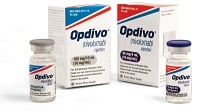
Bristol-Myers Squibb's ($BMY) immuno-oncology med Opdivo is charging past competitors, racking up positive data and earning regulatory gold stars in record time. Now, the drug is poised to gain even more ground after the European Medicines Agency's (EMA) Committee for Medicinal Products for Human Use (CHMP) gave Opdivo its marketing thumbs-up as a first-line treatment for advanced melanoma--an approval it has yet to earn in the U.S.--and in previously treated patients.
Regulators based their approval on two studies of the drug in patients with advanced malignant melanoma, which found that Opdivo (nivolumab) improved individuals' survival rate and response rate compared to traditional chemotherapy. In a study with 418 patients who received BMS' drug or a standard chemo med dacarbazine, 73% of individuals who took Opdivo had a higher survival rate, as opposed to 42% in the standard chemo group. And in a second study with 405 patients who had already received BMS' cancer treatment Yervoy, more individuals responded to Opdivo than traditional chemo--about 31% compared to 10.6% in the chemo group. The EMA usually accepts a recommendation within several months.
The news adds fuel to BMS' engine as it continues to gobble up market share for Opdivo. If Opdivo is approved by the EU, it would be the first PD-1 inhibitor to be sold there ahead of Merck's rival therapy. In December 2014, the company scored FDA approval for Opdivo three months ahead of schedule, setting the stage for head-to-head competition with Merck ($MRK) and its PD-1 powerhouse Keytruda. Both Keytruda and Opdivo block PD-1, a mechanism cancer cells use to escape detection by the body's immune system.
But BMS jumped ahead of Merck in March after it picked up a second FDA nod for Opdivo in record time. The agency OK'ed the drug to treat squamous non-small cell lung cancer (NSCLC) that has advanced despite chemotherapy, helping BMS access a broader population as squamous patients count for about 30% of the NSCLC population.
And the additional approval could do wonders for BMS' bottom line, bringing in $1 billion to $1.5 billion in sales, Evercore ISI analyst Mark Schoenebaum said at the time. Analysts have estimated Opdivo will chart peak sales of around $5 billion a year, but some believe that number will grow to as much as $7.3 billion by 2020.
Still, BMS faces competition from other drugmakers eager to cash in on the PD-1 market, which analysts said could generate sales of $22 billion to $33 billion by 2020. Roche ($RHHBY), AstraZeneca ($AZN) and Merck all have PD-1 candidates in trials and are eyeing regulatory approval for their products. Merck is on track to file an NDA midyear and get an approval for its drug, and Roche and AstraZeneca are shooting for FDA approval in 2016. And while investors have pegged "winners and losers" in the category, who will emerge the winner remains anyone's best guess.
"Because of the size of the immuno-oncology opportunity … there will be more than one way to win," Bernstein analyst Tim Anderson said.
- read the EMA statement
- here's the BMS release
Special Report: The 10 best-selling cancer drugs of 2013